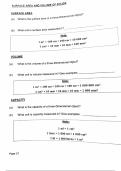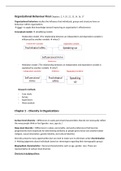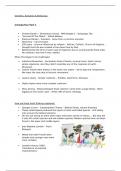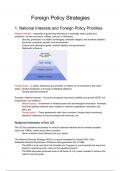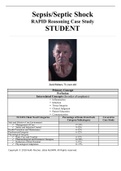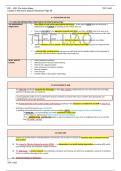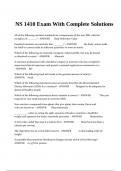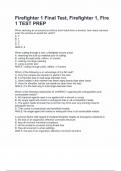• Why qualitative approach?
o Focus on peoples’ own framing around issues
o Richer/deeper understanding of a phenomenon
o Can be open-ended, exploratory, organic and exible + can evolve to suit
needs of the participant
▪ Scope of knowledge and understanding is opened up
• Thick or rich description:
o Thick description → contexts of behaviour were described
o Thin description → contexts of behaviour were excluded
o Rich description → “detailed descriptions of the object of study, in which
the complexity and contradictions of participants’ stories of their lives are
included”.
Qualitative Quantitative
⭐ Uses words 📊 Uses numbers
⭐ Explores meanings (produces knowledge that
📊 Explores relationships between variables
contributes to more general understandings)
⭐ Less xed methods ( exible) 📊 Has xed method (in exible)
⭐ Theory generating (inductive)
📊 Theory testing (deductive)
⭐ More time consuming
⭐ Requires less respondents 📊 Less time consuming
⭐ Subjective & re exive (values personal
📊 Requires more respondents
involvement + partiality)
Ex: Interviews - Focus Groups - Literature Review 📊 Objective (values detachment + impartiality)
Ex: Experiments - Surveys - Observations
1.1. Skills needed to become a QR
These are the following:
1. Interest in process & meaning – curiosity about what people think & their motivations behind
behaviour.
2. Critical approach to life & knowledge – interested in how or what, but question why people
think in a certain way.
3. Eyes & ears – observing (e.g. about gestures, behaviour) & speaking
• Both listen intently & critically re ect on what is said at the same time.
fi fi fl fl fl fl fl
, • Focus on content & have analytic ideas simultaneously.
4. Re exivity – critical re ection on the research (both as process and as practice), our role as
researcher, and our relation to knowledge.
• Re ecting on your own role as QR when producing knowledge (e.g. what are your own
thoughts, if you are an insider/outsider).
• Insider = researcher shares group identity w/ participants.
• Outsider = di ers from group identity.
• Identifying your own assumptions, & then putting them aside
• Why? To ensure your research is not automatically shaped by these.
5. Good interactional skills – research consists in constant interaction w/ people (professional
communication skills & friendliness).
• A friendly manner helps people put at ease + establish ‘trust’ & rapport.
1.2. What is QR?
• QR = uses words as data (not numbers)
• Interest in meanings & perspectives or experiences
• Rich data (samples are small) – in depth, descriptive, complicated & detailed info on
phenomena.
• Theory generating (inductive) – working up from data
• No previous theoretical framework, no hypothesis formulated before, no speci c
expectations beforehand, w/ data we try to build a theory (no theory testing).
• Takes longer to complete – why? Interpretative
1.3. Big Q vs. Small Q
Big Q – broad perspective = QR = The application of qualitative techniques within a qualitative
paradigm.
• Paradigm (approaches) = the beliefs, assumptions, values and practices shared by a research
community – provides an overarching framework for research.
• Perspective
Small Q – pragmatic approach (based on RQs) = the use of speci c qualitative data collection
and techniques
• Techniques
• QR can be used before quantitative research – e.g. rst interviews or focus groups, then
experiments or surveys to explain phenomena.
• Mixed Method (both quantitative & qualitative combined)
• Use QR as input for survey or experiment
flfl ff fl fi fi fi
, • Occasional use of qualitative questions within quantitative method.
• More common in Communication Science
1.4. History of QR in Communication Science?
• Interdisciplinary
• Involved in many disciplines.
• Psychology
• QR has a long BUT marginal history in psychology
• a) QR as a new development = BUT Qualitative ideas and approaches have been part of
psychology from its inception.
• There has been opposition to the more subjective, interpretative introspective
• The use of a qualitative paradigm was in many cases an implicit and often
explicit rejection of the values, assumptions and practices of quantitative,
experimental psychology
• b) QR as simply o ering a complementary data collection and analysis toolkit for
quantitative psychology
• Allows access to people’s subjective worlds and meanings, and to groups
marginalized
• QR methods are crucial for identifying and theorizing di erent constructed
versions of reality, and for the ways people are both constructed by
• Sociology
• Political Science
• QR in Communication Science tracks
2. 10 Fundamentals of QR
2.1. Fundamentals
1. QR is about meaning (not numbers)
• We focus on the meanings of participants to understand these people and what they think of a
commercial or phenomena (irrelevant to replicate results).
• Meaning is complex & messy.
• Considers knowledge as something that comes from, and makes sense within the contexts it
was generated from.
• Not about testing hypotheses, replication or seeking comparisons between groups.
• QR does not assume the ‘same’ accounts will be generated every time, by any
researcher.
ff ff
, 2. QR does not provide a single answer
• Subjectivity – there is no correct or incorrect answer – sometimes can be vague.
• Requires good argumentation to justify how you obtain conclusions.
• Need to be creative when using data.
• Analysis of data will be di erent – this varies across researchers as analysis of data will be
in uenced by social and cultural background, experiences, demographics to build theory.
• Good analysis needs to be plausible, coherent and grounded in the data.
3. QR treats context as important
• Knowledge, information, answers and conclusions are produced in speci c contexts.
• People will have di erent perspectives and attitudes.
• QR recognizes the subjectivity of data & analysis we produced (and possible bias) – 2 levels of
subjectivity
• (1) Subjectivity of data – interpretations of participants are subjective.
• (2) Subjectivity of data interpretation – when researcher starts using data in his analysis
(his background in uences his analysis).
• → Bias = research or data might be contaminated by our lack of objectivity.
• Due to subjectivity, we see and understand re ects our identities and
experiences
4. QR can be experiential or critical
• Experiential = focus on views, perspectives, experiences expressed in the data – what people
mention about the message and how can we use what they say in analysis.
• Verstehen (understanding in German) = try to understand people and put into their
shoes.
• Participant’s interpretations are focused on, not used for analyzing something else.
• Retains people’s own framing around issues (in their own language).
• QR as research to collect info and organize what is expressed in data & make sense
of it.
• Critical = not use the words of participants but cultural notions below the surface – what are
the underlying perspectives (underlying attitudes) or factors that in uence meanings or
representations expressed
• Analysts’ interpretations become more important than participants.
• Explores how di erent versions of reality are created/constructed.
• Micro = detail of language use (e.g. how is language used/functions)
• Macro = language produces versions of reality (e.g. what language suggests)
fl
ff flff ff fl fifl



